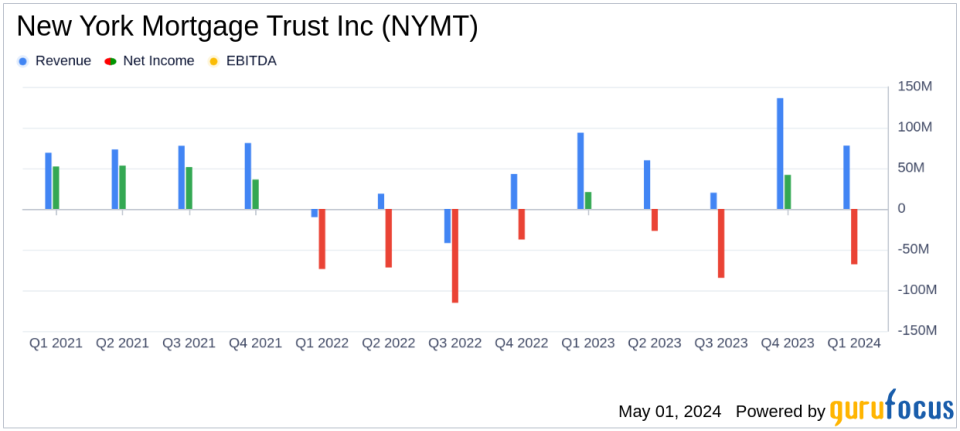New York Mortgage Trust Inc Reports Significant Q1 2024 Loss, Missing Analyst Estimates
Net Loss: Reported a net loss of $68.34 million, significantly below the estimated net loss of $11.83 million.
Earnings Per Share (EPS): Recorded a basic loss per share of $0.75, falling short of the estimated earnings per share of $0.12.
Revenue: Generated interest income of $83.89 million, showcasing the company's capacity to earn through its interest-earning assets.
Dividends: Declared dividends of $0.20 per common share, indicating a return to shareholders despite the net loss.
Book Value: Ended the period with a book value per common share at $10.21 and an adjusted book value per common share at $11.51.
Net Interest Income: Net interest income stood at $17.86 million, demonstrating the core earnings from the company's lending activities.
Comprehensive Loss: Comprehensive loss matched the net loss at $68.34 million, reflecting broader financial challenges.
New York Mortgage Trust Inc (NASDAQ:NYMT) disclosed its financial outcomes for the first quarter of 2024 on May 1, 2024, revealing a substantial net loss that starkly contrasts with analyst expectations. The real estate investment trust, specializing in mortgage-related and residential housing assets, reported a net loss of $68.34 million, or $0.75 per share, significantly underperforming against the estimated earnings of $0.12 per share. The details of these results are available in the company's 8-K filing.

New York Mortgage Trust Inc operates as an internally-managed REIT, focusing on acquiring, investing in, financing, and managing mortgage-related single-family and multi-family residential assets. Its investment strategy includes structured multi-family property investments, distressed residential assets, and various other mortgage-related and residential housing-related assets.
Q1 2024 Financial Performance
The company's financial distress in Q1 2024 was primarily driven by a net interest income of only $17.86 million, despite generating $83.89 million in interest income. The substantial interest expenses, amounting to $66.03 million, significantly eroded the earnings. Additionally, NYMT faced a comprehensive loss of $68.34 million, mirroring its net loss figures, and reported a negative economic return on book value of -7.96%.
The yield on average interest-earning assets stood at 6.38%, with a net interest spread of 1.31%. However, the adjusted book value per common share decreased to $11.51 from a higher value in the previous quarter, indicating a reduction in asset valuations.
Strategic Adjustments and Market Challenges
Jason Serrano, the CEO of NYMT, highlighted the economic headwinds faced during the quarter, including a lower-than-expected U.S. GDP growth rate, which signaled potential late-stage cycle conditions and a higher risk of recession. The company has responded by lowering credit exposure and focusing on fixed income investments, particularly short-duration mortgage credit and Agency RMBS, which continue to provide compelling returns.
NYMT's strategic shift away from multi-family joint venture equity investments, which now represent less than 5% of the companys capital allocation, is part of its broader strategy to stabilize book value. The divestment from these investments has been challenging due to a higher rate environment and unfavorable market conditions, which have negatively impacted valuations.
Investment and Financing Activities
During the quarter, NYMT actively managed its portfolio through various transactions. It purchased approximately $297.6 million of Agency RMBS and around $305.7 million in residential loans. Additionally, the company completed a securitization of business purpose loans, generating about $223.2 million in net proceeds, and redeemed a residential loan securitization, securing approximately $273.7 million from a new securitization.
The company's capital allocation as of March 31, 2024, was predominantly in single-family residential loans, with significant holdings also in investment securities available for sale and multi-family loans.
Outlook and Forward Strategies
Looking ahead, NYMT plans to continue adjusting its portfolio to mitigate risks associated with the current economic environment and to capitalize on growth opportunities. The focus will remain on sectors that offer the most stability and potential returns, such as Agency RMBS and residential loans.
The company's management will further discuss these results and strategies in a conference call scheduled for May 2, 2024. Stakeholders are encouraged to participate to gain deeper insights into the company's operations and future plans.
For more detailed financial information, stakeholders are advised to review the companys forthcoming Quarterly Report on Form 10-Q for the quarter ended March 31, 2024, which will be filed with the SEC around May 3, 2024.
Explore the complete 8-K earnings release (here) from New York Mortgage Trust Inc for further details.
This article first appeared on GuruFocus.

 Yahoo Finance
Yahoo Finance 